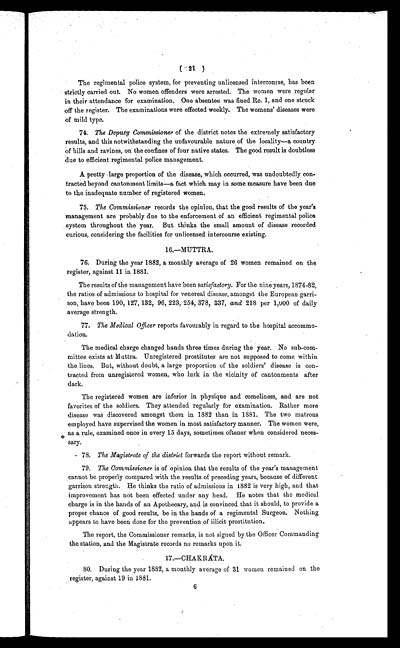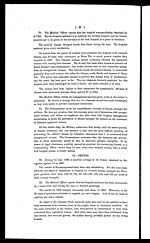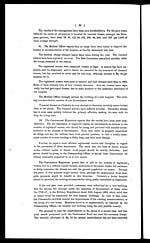Medicine - Institutions > Lock hospitals > Annual report on the working of the lock hospitals in the North-Western Provinces and Oudh > 1882
(331) Page 21
Download files
Individual page:
Thumbnail gallery: Grid view | List view

( 21 )
The regimental police system, for preventing unlicensed intercourse, has been
strictly carried out. No women offenders were arrested. The women were regular
in their attendance for examination. One absentee was fined Re. 1, and one struck
off the register. The examinations were effected weekly. The womens' diseases were
of mild type.
74. The Deputy Commissioner of the district notes the extremely satisfactory
results, and this notwithstanding the unfavourable nature of the locality—a country
of hills and ravines, on the confines of four native states. The good result is doubtless
due to efficient regimental police management.
A pretty large proportion of the disease, which occurred, was undoubtedly con-
tracted beyond cantonment limits—a fact which may in some measure have been due
to the inadequate number of registered women.
75. The Commissioner records the opinion, that the good results of the year's
management are probably due to the enforcement of an efficient regimental police
system throughout the year. But thinks the small amount of disease recorded
curious, considering the facilities for unlicensed intercourse existing.
16.—MUTTRA.
76. During the year 1882, a monthly average of 26 women remained on the
register against 11 in 1881.
The results of the management have been satisfactory. For the nine years, 1874-82,
the ratios of admissions to hospital for venereal disease, amongst the European garri-
son, have been 190, 127, 132, 96, 223, 254, 378, 337, and 218 per 1,000 of daily
average strength.
77. The Medical Officer reports favourably in regard to the hospital accommo-
dation.
The medical charge changed hands three times during the year. No sub-com-
mittee exists at Muttra. Unregistered prostitutes are not supposed to come within
the lines. But, without doubt, a large proportion of the soldiers' disease is con-
tracted from unregistered women, who lurk in the vicinity of cantonments after
dark.
The registered women are inferior in physique and comeliness, and are not
favorites of the soldiers. They attended regularly for examination. Rather more
disease was discovered amongst them in 1882 than in 1881. The two matrons
employed have supervised the women in most satisfactory manner. The women were,
as a rule, examined once in every 15 days, sometimes oftener when considered neces-
sary.
78. The Magistrate of the district forwards the report without remark.
79. The Commissioner is of opinion that the results of the year's management
cannot be properly compared with the results of preceding years, because of different
garrison strength. He thinks the ratio of admissions in 1882 is very high, and that
improvement has not been effected under any head. He notes that the medical
charge is in the hands of an Apothecary, and is convinced that it should, to provide a
proper chance of good results, be in the hands of a regimental Surgeon. Nothing
appears to have been done for the prevention of illicit prostitution.
The report, the Commissioner remarks, is not signed by the Officer Commanding
the station, and the Magistrate records no remarks upon it.
17.—CHAKRÁTA.
80. During the year 1882, a monthly average of 31 women remained on the
register, against 19 in 1881.
6
Set display mode to: Large image | Zoom image | Transcription
Images and transcriptions on this page, including medium image downloads, may be used under the Creative Commons Attribution 4.0 International Licence unless otherwise stated. ![]()
| India Papers > Medicine - Institutions > Lock hospitals > Annual report on the working of the lock hospitals in the North-Western Provinces and Oudh > 1882 > (331) Page 21 |
|---|
| Permanent URL | https://digital.nls.uk/75111864 |
|---|




